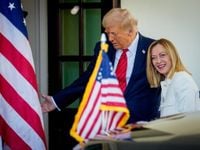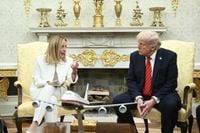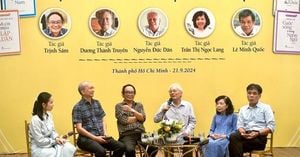On Thursday, April 17, 2025, U.S. President Donald Trump and Italian Prime Minister Giorgia Meloni met at the White House, expressing optimism about a potential United States-European Union tariffs deal amid a backdrop of economic uncertainty. The meeting marked a significant moment as Meloni became the first European leader to visit Trump since he announced a 20 percent tariff on EU exports, a move that has since been suspended for 90 days.
During a working lunch and a private meeting in the Oval Office, the two leaders struck a warm tone, with Trump declaring, "There will be a trade deal, 100 percent," while Meloni expressed her confidence, stating she was "sure" they could reach an agreement. The Italian prime minister highlighted their shared conservative values, declaring her ambition to "make the West great again." This phrase, echoing Trump's campaign slogan, underscores the ideological alignment between the two leaders.
Meloni's visit comes at a crucial time as she represents nearly €50 billion worth of goods sold to the U.S. annually, making Italy the third-largest European exporter to the United States. As she seeks to strengthen ties with Washington, the backdrop of a 90-day negotiation window for a trade deal adds urgency to her diplomatic efforts.
Al Jazeera's Alan Fisher reported from the White House, noting that European leaders are "banking on Meloni" to convey their message to Trump more effectively. Meloni's approach attempts to position her as a mediator capable of de-escalating tensions between the U.S. and the EU. However, despite the optimistic rhetoric, Meloni returned to Italy without any concrete outcomes from her visit, aside from a possible invitation for Trump to visit Rome in the near future.
While the discussions centered on trade, they also touched on broader geopolitical issues. Trump criticized Europe, urging it to "get smart" on immigration and to boost defense spending on NATO. He expressed skepticism towards Ukrainian President Volodymyr Zelenskyy, a stark contrast to Meloni's staunch support for Ukraine since Russia's full-scale invasion in 2022. Meloni had recently condemned Russia's attacks, labeling them "horrible and vile." This divergence in views on Ukraine reflects the complexities of their alliance.
Meloni's diplomatic strategy is reminiscent of former Italian Prime Minister Silvio Berlusconi, who successfully leveraged his relationship with President George W. Bush during his tenure. Federiga Bindi, a professor at the University of Rome Tor Vergata, noted the challenges Meloni faces in balancing the interests of Italian voters while appealing to the broader European bloc. Bindi remarked, "Berlusconi managed to pull it. I am not sure if Meloni can manage to pull it with Trump." The historical context highlights the difficulties in forging strong ties with an unpredictable U.S. administration.
The Italian prime minister's visit also serves domestic interests, as Trump's threatened tariffs could significantly impact Italian industries. Following her Washington trip, Meloni returned to Rome to meet with U.S. Vice President JD Vance, further solidifying Italy's role as a transatlantic conduit. Vance, who is set to attend Easter events at the Vatican, will also meet Cardinal Pietro Parolin, the Vatican's Secretary of State. However, no meeting with Pope Francis has been scheduled, as the pontiff has reduced his public engagements due to health concerns.
Meloni's outreach to Trump has sparked mixed reactions within the EU. Some allies, like France’s Industry Minister Marc Ferracci, have cautioned that her unilateral overtures could disrupt the current dynamics within the bloc. Yet, the European Commission welcomed her engagement with Trump, indicating that it was coordinated with Brussels.
In summary, the meeting between Trump and Meloni encapsulates the complexities of U.S.-EU relations, characterized by shared interests but also significant challenges. As both leaders seek to navigate their respective political landscapes, the outcome of their discussions remains uncertain. With a looming deadline for a trade deal, the stakes are high, and the world watches closely to see how this transatlantic relationship unfolds.






